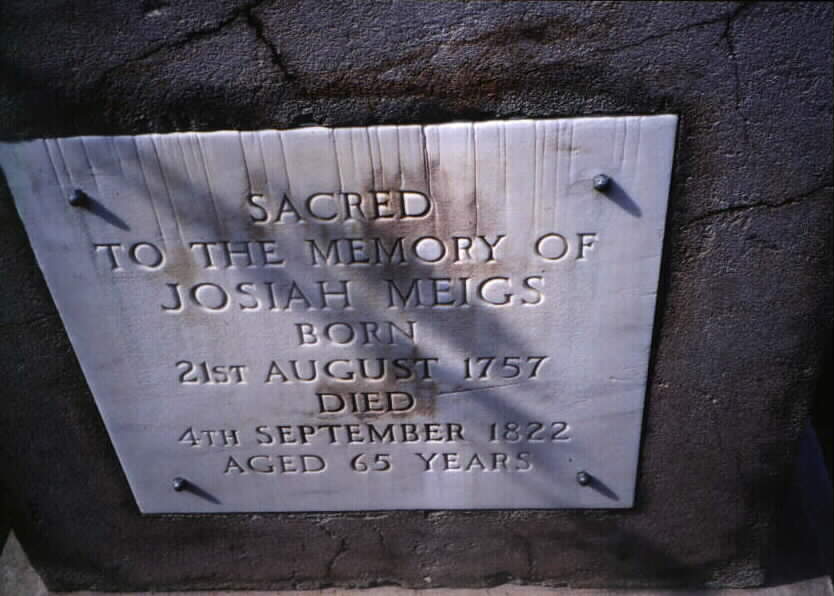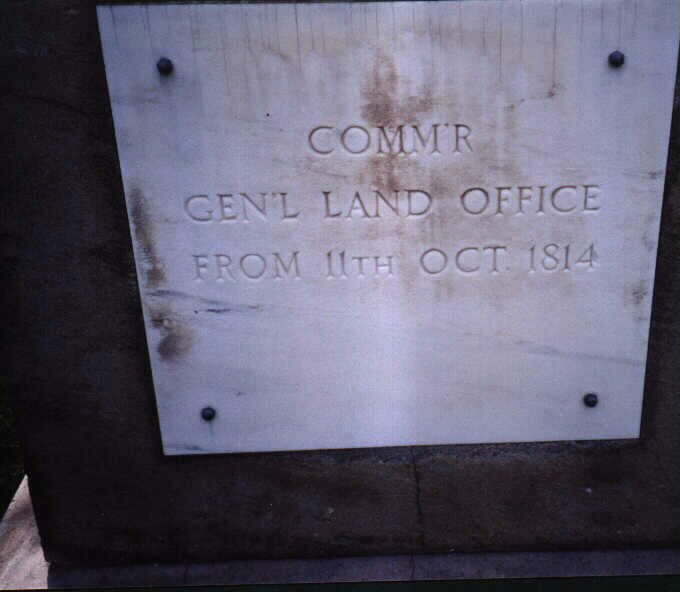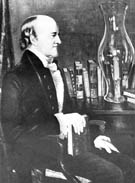The grandfather of Major General Montgomery Cunningham Meigs, he was born on August 21, 1757 and was a lawyer, educator and public official.
He taught school and was a tutor at Yale (where he graduated in 1778). Was an instructor and President of the University of Georgia. Was for a time in charge of the General Land Office and was appointed Surveyor General by President James Madison.
On his death on September 4, 1822, he was buried on the Congressional Cemetery in Washington. He was subsequently reinterred in the family plot in Section 1 of Arlington National Cemetery.
Meigs died on September 4, 1822 and was originally buried in Holmead's Cemetery in Washington, D.C. The cemetery was disbanded and the graves removed, so he was reinterred in Arlington National Cemetery in 1878 in the lot of his grandson, Major General Montgomery Cunningham Meigs.
Josiah Meigs was the 13th and last child of Return and Jabez (Hamlin) Meigs of Middletown, Connecticut. He was born on August 21, 1757. He received a public school education then went on to Yale graduating in 1778. Among his classmates were Noah Webster and Oliver Wolcott.
During the years 1781-1784 he was a tutor in mathematics, natural philosophy and astronomy at Yale, and at the same time studied law. He was admitted to the bar of New Haven, Connecticut, in 1783, and during February 1784, at the first election following the establishment of a city government, was chosen city clerk of New Haven. Later in 1784 he started a printing office where he published the New Haven “Gazette” which later was called The New Haven Gazette and the
Connecticut Magazine. Meigs, through the paper, was often involved in the political passions of his day including a strong support for the adoption of the Federal Constitution and an attachment to Jeffersonian Republican principles. He also published the first American Medical Journal in 1788.
Meigs resigned his position as city clerk during 1789 and left New Haven for St. George, in the Bermuda Islands. There he cared for the interests of some of his law clients. He became involved in defending the owners of United States vessels that had been captured by British privateers. He was a man of hot temper and occasionally was reckless in his speech. As a result of his unpopularity and unguarded statements, he was arrested for treason, but acquitted. In 1794 he returned to the United States and, on October 8, 1794, took the chair of mathematics and natural philosophy at Yale where he remained until 1801.
In 1801, Meigs was chosen the first president of the University of Georgia, or Franklin College as it was called in its early days. The University was located on 633 acres donated for the establishment of the town of Athens and the school. “In the fall of 1801 Meigs hastily erected a few log and frame buildings, sold town lots to raise money for the University, and soon began to impart his precise culture to a handful of young men in a wild and lonely land. The peaceable Cherokee did not interfere, and in 1805 construction was finished on the first permanent building.”
Meigs worked long and hard to establish the foundation of this University, but “a group of Presbyterians became entrenched on the board of trustees. This group was supported by various elements throughout the state who desired that education in the University have a definitely religious basis.” He had neither a religious preference or pretensions. In the face of this increased opposition, criticism of the discipline at the school and in reaction to his political pronouncements, Meigs was forced to resign his position in 1810. He continued as a professor for one more year, but continued to criticize the trustees so they dismissed him.
In November, 1812, President Madison appointed him Surveyor General of the United States. He moved to Cincinnati, Ohio. Two years later he was appointed the Commissioner of the U. S. Land Office in Washington, D.C. It was his job. to supervise and report on the progress of the surveys of the public domain which contained vast tracks of western wilderness. “In 1819 in a widely reprinted statement in the National Intelligencer he took a long look ahead, explaining the five principal meridians and extolling the system of rectangular survey. ‘The principle of this system… will unquestionably be adhered to until the public surveys shall reach Astoria at the mouth of the Columbia river, in longitude 48 degrees west of the capital. It has been said that ‘man brings down the Heavens to the earth, for his convenience.' A few geographical positions on the map of the public surveys being accurately determined by astronomical observations, with very little difficulty the longitude and latitude of every farm, and of every log-hut and court house, may be ascertained with great precision…. About sixty million acres (twice the extent of England) have been surveyed…. So wise, beautiful and perfect a system was never before adopted by any government or nation on earth. It is.. the ‘divided feast' of Homer. The government with a temper and spirit truly paternal, has divided, for the children of the republic, that patrimony in which they all have a right and an interest.'”
As commissioner, Meigs also instituted the nation's first system of daily meteorological observations at the land offices throughout the country. He was also the president of the Columbian Institute, one of the original corporators and trustees of Columbian College (now George Washington University), and professor of experimental philosophy there.
He was described as “tall and spare…he had a large and capacious head with a high forehead, a long and prominent chin, a square mouth and a rather long and pointed nose; and his eyes were mild, but bright, and of a blue tint. In general effect, his face has certainly marked power and is very alive and of a peculiarly benevolent appearance.”
Meigs married Clara, daughter of Colonel John Benjamin of Stratford, Connecticut, on January 21, 1782. She died on August 13, 1849, and is buried in Columbia, Georgia. Josiah died on September 4, 1822. He was buried in Holmead's Cemetery in Washington, D.C., but it was given up as a cemetery, so his grave was moved in July 1878, to the lot of his grandson, General M.C. Meigs, in Arlington National Cemetery. In 1998, my family was privileged to provide funding to restore Josiah's grave to new condition. His grave stone records that he died on September 5, 1822, but his son, Ezra Stiles, writing to his brother Henry on September 5, 1822, stated that their father died at a quarter before eight o'clock “last night.”
Meigs, Josiah (Aug. 21, 1757 – Sept. 4, 1822), lawyer, editor, educator, and public official, was a native of Middletown, Conn., the thirteenth child of Return Meigs, a hatter, and Elizabeth (Hamlin) Meigs. He was a descendant of Vincent Meigs, or Meggs, who came from England and finally settled in New Haven about 1644. One of Josiah's brothers, Return Jonathan, 1740-1823 [q.v.], rendered distinguished service in the War of the Revolution, and his son, Return Jonathan, 1764-1824 [q.v.], had a notable political career. Josiah graduated from Yale in 1778. Among his classmates were Joel Barlow, Noah Webster, Zephaniah Swift, and Oliver Wolcott [qq.v.]. He was teaching at Claverack, N. Y., when, in 1781, he was elected tutor in Yale College. That year he delivered an oration at the New Haven celebration of the victory over Cornwallis, which was published in 1782. On Jan. 21, 1782, he married Clara, daughter of Col. John Benjamin of Stratford, Conn. He was admitted to the bar in April 1783, and in February 1784, at the first election following the establishment of city government, was chosen city clerk of New Haven. After resigning as tutor in 1784, with Daniel Bowen and Eleutheros Dana he opened a printing office and established The New Haven Gazette, a weekly newspaper, the first number of which was issued May 13, 1784. In February 1786 Bowen retired, and the name of the publication was changed to The New Haven Gazette and the Connecticut Magazine. After Aug. 2, 1787, Meigs was sole proprietor until its discontinuance at the close of 1788. It supported the adoption of the Federal Constitution, and among the literary contributions which appeared in its columns was “The Anarchiad,” written by Joel Barlow, John Trumbull, David Humphreys, and Lemuel Hopkins [qq.v.]. Keenly interested in scientific subjects, in 1787 Meigs delivered lectures at Yale on natural philosophy and astronomy.
He retained his position as city clerk until 1789, and at the Fourth of July celebration of that year delivered an oration which was described as “replete with benevolence and Federal ideas” (Connecticut Journal, July 15, 1789, quoted by Meigs, post, p. 26). A few months later he left New Haven for St. George, in the Bermuda Islands, to care for the interests of Connecticut clients. During the latter part of his sojourn there, which lasted until 1794, he advocated the causes of American claimants of captured property in the Court of Vice-admiralty so successfully as to incur the enmity or those who were directly or indirectly engaged in privateering. Furthermore, he was a man of hot temper and occasional recklessness of speech. As a result of his unpopularity and unguarded statements, he was arrested on the charge of treason, and was acquitted and released only through the exertions of Gov. Henry Hamilton.
After his return to the United States, he was appointed, Oct. 8, 1794, professor of mathematics and natural philosophy in Yale College, of which his friend Ezra Stiles [q.v.] was then president. He had by this time become an ardent Jeffersonian. In a Federalist stronghold, and with the inexorable Federalist Timothy Dwight [q.v.] as president of Yale–Stiles had died shortly after Meigs's appointment–it was inevitable that he should get into trouble. Consequently, after several years of friction, in December 1800 he resigned to accept a professorship in the University of Georgia–“exiled” from his native state “to the backwoods of Georgia only twelve miles from the Cherokee Indians,” his wife declared with bitterness years later, “for no earthly reason but his stern democracy” (Meigs, post, pp. 42-43).
Chartered in 1785, this institution was as yet unestablished. Abraham Baldwin [q.v.] was its titular president, and it was at his instigation that Meigs had been called there. Baldwin now resigned and Meigs was elected in his place. He gathered students out of the academies of the state, and instructed them under the trees, in a tavern, and in his own dwelling, until a temporary log building was erected. In 1806 Franklin College, a substantial, three-story brick structure, was ready for occupancy. There were now some seventy students and the institution had acquired reputation throughout the state. Meigs's political pronouncements, however, his ill-concealed contempt for Georgians, whom he considered rude and uncivilized, and his frankness of speech soon made him enemies. The number of students decreased; his salary was reduced; and in August 1810 he resigned the presidency. He continued as professor for a year, and at the end of that time was charged with gross criticism of the trustees, and was dismissed. He published A Statement of the Causes of the Removal . . . (1811).
In November 1812 the President appointed him surveyor-general of the United States, and he took up his residence in Cincinnati. Two years later, October 1814, he was made commissioner of the General Land Office of the United States, at Washington. In this city he lived pleasantly for the remainder of his life. From 1819 until his death he was president of the Columbian Institute. He was one of the original corporators and trustees of Columbian College (now George Washington University), and professor of experimental philosophy there. His daughter Clara married John Forsyth [q.v.], later secretary of state under Jackson and Van Buren; Charles Delucena Meigs [q.v.] was his son; Montgomery C. Meigs and John Forsyth Meigs [qq.v.], were his grandsons.
MEIGS, JOSIAH
1ST COMM GEN LAND OFC
- VETERAN SERVICE DATES: Unknown
- DATE OF DEATH: 09/04/1822
- DATE OF INTERMENT: Unknown
- BURIED AT: SITE 1
ARLINGTON NATIONAL CEMETERY
Michael Robert Patterson was born in Arlington and is the son of a former officer of the US Army. So it was no wonder that sooner or later his interests drew him to American history and especially to American military history. Many of his articles can be found on renowned portals like the New York Times, Washingtonpost or Wikipedia.
Reviewed by: Michael Howard



